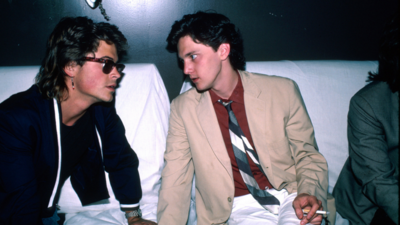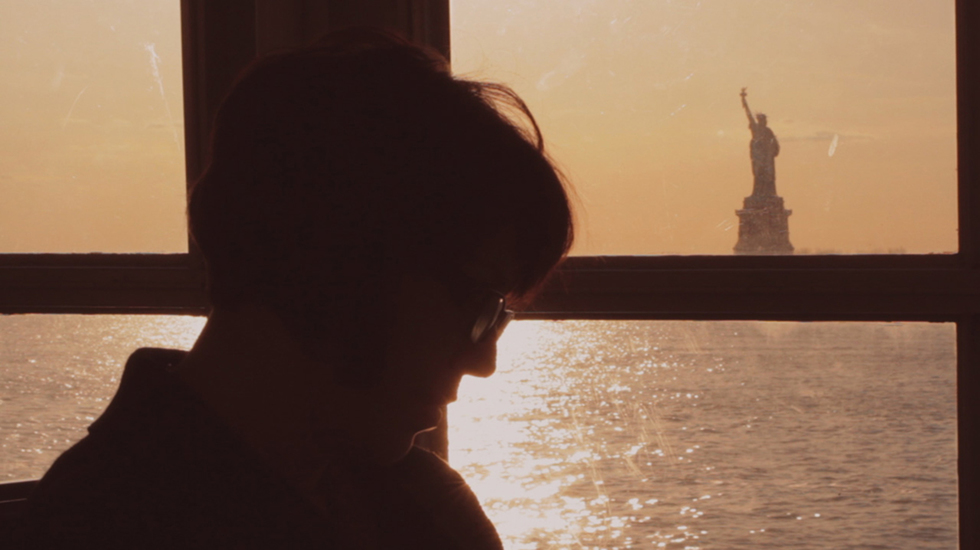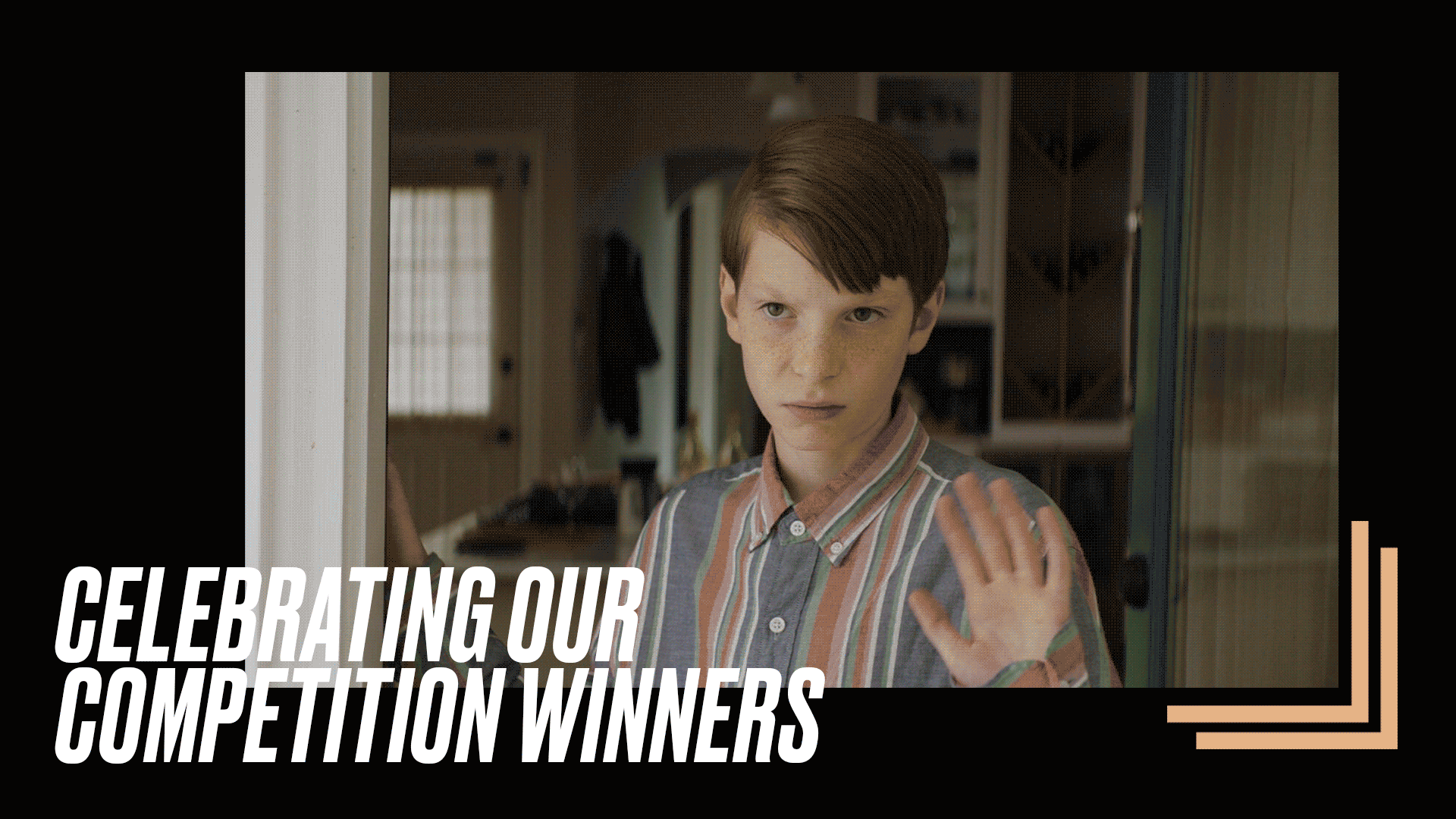
BY KAREN KEMMERLE |
‘In God We Trust’ Directors Derek Anderson and Victor Kubicek on Bernie Madoff and One Woman’s Incredible Journey
The fall-out from the Bernie Madoff scandal is far from over. Filmmakers Derek Anderson and Victor Kubicek spent three years following the story of Eleanor Squillari, who was Bernie Madoff’s personal secretary for over 25 years, as she began a mission to fight injustice for all.

Tribeca: Could you tell our audience a little bit about In God We Trust. What inspired you to tell the story?
Derek Anderson: I think the thing that really inspired us the most was Eleanor Squillari, Bernie Madoff’s secretary for nearly three decades. We were immediately fascinated when the news broke about Bernie. It seemed incomprehensible to us that one man could perpetrate such an enormous crime. Then we had the good fortune of meeting Eleanor, a woman whose whole world had collapsed.
She’s a very normal, everyday woman trying to fight, to figure out what her boss had done and to right his wrongs. She thought this was her responsibility. We had the opportunity to meet her just shortly after he was arrested and we knew immediately that her story had to be told.
Victor Kubicek: It was great fortune. Eleanor was a fly on the wall in one of the most interesting rooms in financial history.
Tribeca: How did that meeting come about?
VK: Well actually we were introduced to Eleanor through Mark Seal, a journalist who co-wrote the story in Vanity Fair with her in the April, 2009 issue. We were speaking with Mark Seal about Bernie Madoff and the scandal, and he said “If you guys are interested in this subject, you have to meet Eleanor.” In short order, he arranged a meeting, and we got along with Eleanor instantly. It was a meeting of the minds and a little bit of a lovefest. That was back in 2009, shortly after the arrest.
Here in America, investor confidence is why Wall Street works, and I think, to be honest, that confidence is very misplaced now.
Tribeca: You deftly incorporated archival footage, in a way that helped to paint the most complete portrait of the Madoff family—Bernie, Ruth, Mark, and Andy in particular. It was incredibly effective—especially footage from the Madoff Company retreats. How did you gain access to this resource?
VK: We were looking for interesting archival footage because a lot of the images kept surfacing when the media was covering Madoff. The company retreat footage was actually from the widow of a man who worked at Madoff for many, many years. He would go to all the company retreats and, rather than socialize, he hid behind his camera. Each year after the retreat, he would edit a little tape and show it to all the employees.
I had a long lunch with the widow at her home in Poughkeepsie. She invited us upstairs saying, “Well I just want to show you some of the things that I have.” And she brought out these VHS tapes that provide this really intimate fly-on-the-wall footage of the employees, the younger Bernie and Ruth, and the boys when they were teenagers. Ruth and everybody that worked at Madoff— because it was really a family company—worked there years and years. Part of the shock and abhorrence to Eleanor was that some of the people that she really considered family were also involved in this crime.
Tribeca: I thought you made an interesting choice to focus on Andy and Mark Madoff. Most people tend to associate the Madoff name with pure corruption and evil, but your portrait of the sons painted a more complex portrait. How important was it to discuss Mark Madoff’s suicide in the documentary?
VK: It was very important to us; it was very important to Eleanor. We actually had the opportunity to meet Andy a couple times in this process, off-camera with Eleanor. We didn’t draw any immediate conclusions about the sons and their involvement, and as we watched things unfold and as we learned more, it became clearer to us that maybe events had not happenedquite the way the media was portraying.
DA: I think it was also important for us to follow Eleanor’s process, but we also didn’t want to draw any conclusions. We focused on the truth that we could find in the process. Certainly in the beginning, we held everyone in doubt since they were all connected to the biggest crime in history.
We knew immediately that Eleanor completely believed in the sons’ innocence. That was really interesting for us to explore because the world’s view, the media’s view, the public’s opinion was that they had to know.
VK: And how quickly they were villainized. There was no innocent until proven guilty for them. Everyone with the last name Madoff was immediately guilty as charged. What was interesting to us was that the world held that point of view, but Eleanor had a different point of view. So it was really important for us to follow through and find out why Eleanor believed that they were blameless.
One of the things about the boys’ story that was really compelling to us was that it really showed who Bernie was. He was this master manipulator who fooled a lot of people. He was willing to use anybody and everybody in a way that served him, even his own children. Even if they were involved in the crime, you have to ask what kind of father would bring his children into something like that.
Tribeca: Even though the Madoff trial was so public and so much is known about the case, the documentary unfolds like a thriller. It’s riveting to watch. How closely did you work with editor Melody London to build suspense?
DA: The editing process was probably the toughest part of making this film. We have over 200 hours of footage, and the story is unbelievably complex. One of the things that struck us was how much of the truth of what really occurred wasn’t being covered in the media. It was important for us to share that, and it was also really important for us to share Eleanor’s emotional journey, her personal journey. We also had to provide a lot of basic facts that we could not assume people knew. We had to balance of all three of those things.
Tribeca: Some of the most interesting characters in the story were Michael DeVita and his mother. You got to speak directly to a lot of victims of the Madoff scandal, but they were examples of Middle America. I thought the material about HR757, or the Treatment of Investors Act, was very interesting. How did you meet DeVita and get involved with his advocacy?
DA: We met a lot of the victims, but I think the reason we picked Mike and Emma is they really exemplify the average American investor, and I don’t think people realized that Madoff had a lot of normal, hard-working people in his fund. They weren’t rich; they didn’t have a fortune to invest. And what was really compelling about the DeVitas was that they really believed in the American dream. They were the people who served in the armed forces when called and lived below their means to make conditions better for the next generation. They never expected a handout; they always were there to help.
VK: The DeVitas were very similar to Eleanor in that they took responsibility for the situation they were in. They educated themselves. They fought to make sure people were informed, and they’re fighting for change in the laws. For us, that made tham important forin the film. A positive message to take away is that, no matter what happens, people can make a difference.
In a way, Bernie represented a false portrayal and representation of the American dream, but people like Eleanor and the DeVitas are truly living the American dream. If something knocks them down, they still get back up and keep forging ahead.
Tribeca: Has Eleanor seen the film?
VK: Eleanor has seen the film. We have been working with her for three years, so she has been with us every step of the way. She’s seen many iterations of the film, and she’s really proud of the work.
DA: Eleanor is such a humble person who is really funny. At one point, she said, “I can’t believe you see me this way.” And we said, “Eleanor, this is actually what you did.”
Tribeca: And she does not seem to think that she is special.
VK: She’s very principled, and it’s very encouraging. She is a ray of sunshine and a ray of hope. If she can find a way to forge ahead under the most devastating personal and professional circumstances, then everybody can hope to climb out of whatever terrible thing befalls them.
VK: The whole time that we were making this film, she was actively trying to get a job, and it never happened. Sad to say, many people would call Eleanor in for an interview just because they wanted to see her out of curiosity. She was almost a pink elephant at the zoo with people coming to poke at her with a stick. No one ever had any real intentions of hiring her, but maybe now they might.
You have to ask what kind of father would bring his children into something like that.
Tribeca: So what do you hope to accomplish with the documentary? I know it was very clear at the end that Eleanor wants to deter other people from committing white-collar crimes. Do you share the same goal?
VK: Absolutely. I think one of the things that we’re very proud about with this movie is that it is a call to action. I think it forces people to evaluate our financial system and to realize that regulation is also a global issue as well. Here in America, investor confidence is why Wall Street works, and I think, to be honest, that confidence is very misplaced now. The lack of protections is alarming.
DA: We hope that the movie will encourage people to take responsibility and take action. There are some very simple things that investors can do to make sure that the people they trust with their money are actually looking after it. We also hope that, on some level, the film helps to bring about some legislative change.
Tribeca: There was a lot of shocking information in the film, but was there anything in particular that, during the process of the documentary, really surprised you?
DA: The most shocking thing to me was the amount of money that the IRS collected based on the phantom profits that people made in Bernie’s hedge fund. Our US Tax Code says that the US Government cannot collect taxes on money that is not earned. It is written in our tax code. And yet, our government still collected taxes on phantom income, and the majority of that has not been returned to tax payers.
To me, I find that shocking. We live in a democracy, a country where the government is for the people, by the people. And yet our government is not in any way honoring our tax code.
VK: They’re not even really engaging in that conversation.
Tribeca: So what are you looking most forward to at Tribeca this year?
VK: This is the first documentary we’ve ever produced, and this is the first film we’ve ever directed. So we are really excited to share it with people. And I think a lot of the questions you asked us remind me of the fact that we’re hoping to show people a side of this they haven’t seen or heard yet.
DA: And I think for me Tribeca’s really exciting. From the beginning, we didn’t start the film with any pre-conceived ideas of where it was going. But at some point in the early stages of the film, we decided that Tribeca would be where we wanted to debut this film. It’s a global story, and I think it speaks to people everywhere, but this is our hometown and it’s a story that happened in New York.
In God We Trust premieres Friday, April 19, at the SVA Theatre. For more information and additional showtimes, please visit our Film Guide listing.

